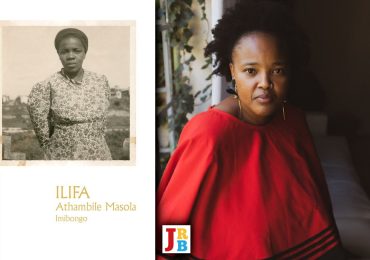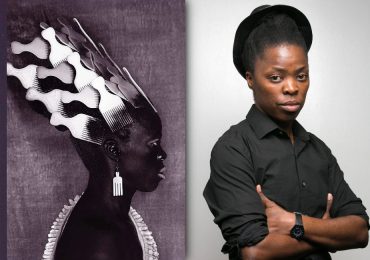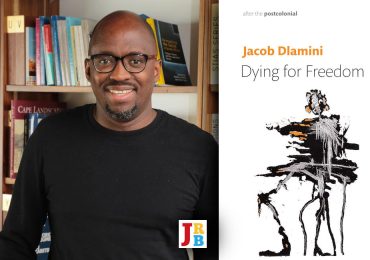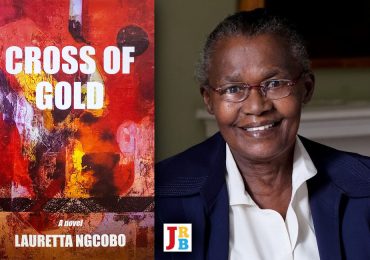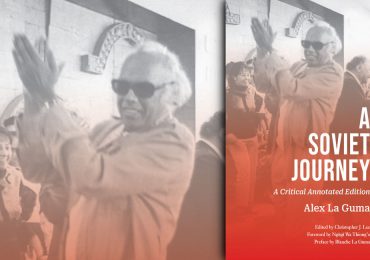The JRB presents an excerpt from Ada’s Realm, the long-awaited novel by Sharon Dodua Otoo, winner of the prestigious Ingeborg Bachmann Prize.
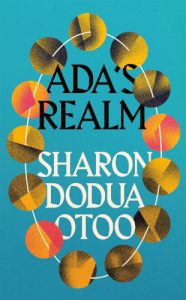
Ada’s Realm
Sharon Dodua Otoo (translated by Jon Cho-Polizzi)
Quercus Publishing, 2023
I did not want a grave. There should not be another forgotten, overgrown place for which no-one would care after we had departed—and that would be soon, after all: We were only waiting for a sign. No grave. But there should be a ritual, Naa Lamiley knew which one.
Not until early evening, after the hearth fire had been fanned, the soup cooked, and the yams mashed—not until all of us had eaten, only then would one of my mothers ‘take care of the baby’. Unless I could steal away with him while the toothless ones—surrounded by plucked feathers and slaughtered hens—continued to chatter on excitedly. I would walk to the great water, approach its edge, and permit the tiny, peaceful body to glide out upon the waves. This was my wish.
Because I did not yet want to show myself at market—it was still too soon—I sent Naa Lamiley instead to collect the two or three yams we needed for the ritual. She nodded, first in exhaustion, then in determination—disappearing with a basket of smoked fish. I also threatened to disappear. Before my eyes an all-encompassing blackness spread. A hole. Were I to fall into it, there would be no escape.
The toothless ones calmed themselves, and the hens, too, ceased their clucking and flapping. Mami Ashitey cackled on, hobbling about and fluttering her arms in the air.
‘Naa?’ she cried, her right eye tearing.
Naa Odarkor shook her head. Seconds before, she had watched as Mami Ashitey rubbed her face with her dusty hand. I should have removed whatever it was that ended up in her eye—it would have been better, for Naa Odarkor’s fingers shook—but it was still too soon. I could not tolerate Naa Odarkor’s loving gaze upon her wife, the tenderness of her touch, the pettiness of Mami Ashitey’s pain. By the time I had turned away, it was already over.
Gradually, they all resumed their activities—the sweeping of the yard, the fanning of the flames, or the chewing of kotsa. That the toothless ones still used kotsa at all! Even I only used the chewing sponge after meals or occasionally to remove a particularly foul taste from my mouth. But these elders? If they had had one single tooth to share amongst them, it would have been a lot! And yet they chewed day in and day out, as if they were trying in vain to grind down a piece of gristle.
My baby was covered with a white cloth and was safe from both the swirling dust and their flying spit. I just should have waited for Naa Lamiley. Even centuries later, I still will not know what I was thinking. In any case, the bracelet was already untied. I held it in my right hand and counted the golden beads with my thumb.
Thirty, thirty-one, thirty-two … thirty-three moon phases ago, when I had noticed that the line below my belly button was beginning to darken again, I had left no stone unturned. At first, I had prayed to Jehovah, the God of the whites, for I had been told that he was a jealous God, and thought He might appreciate that I had turned to Him first in my hour of need. And so, I had closed my eyes, folded my hands together, and moved my lips zealously. Still kneeling, the thought came to me that it would be prudent to next venerate the coastal deity, Ataa Naa Nyɔŋmɔ, because the combination of the masculine ‘Ataa’ and the feminine ‘Naa’ were surely more powerful than Jehovah’s one-sided masculinity. In the end, I could merely offer Ataa Naa Nyɔŋmɔ one song in Ga. My voice could not quite reach the high notes, but at least I had known the words. Then I had put on the bracelet, hoping this time that the golden beads might convince the dead to protect my unborn child. That, at least, was the subject of another hasty prayer in Arabic, which my first mother had taught me a long, long time ago. In the quiet after the duʿāʾ, I poked my distended belly button, and I was confident that my efforts could also please Allah. But all these efforts were in vain. My baby died anyway.
What was so wrong with me that my children did not come to stay? I saw nothing, for my lashes were too heavy with tears and pain, but at least I could still pray softly with my fingers and lips. And then, as I began to count the beads of the bracelet once more, it dawned on me: My son did not have to return naked to Asamando, like his brother before him. The golden beads, which by no means belonged to me alone, should adorn his waist. And the thought that in this way, the bracelet would finally return to my foremothers, comforted me a little. I sat beside him. The bracelet was not quite long enough, and so I carefully removed three threads from the seam of my cloth. With the tips of my fingernails, I bound them to the wire. The white cloth rustled in the light breeze. It had only a slight bulge beneath it, looking almost innocent. I touched this tiny mound. How hard it was. Like a stone, it was.
‘Oh!’ I moaned, as I retracted my hand. My left hand again. The toothless ones were furious. In two strides, Mami Ashitey was at my side. She struck at me mightily, instantly disappointed that the fibres of her broom were too weak for this application. Then she cursed, turning the broom in the palm of her right hand and striking at me again with the wooden handle. Her movements were quick and precise, as though she had been practising for this all her life.
‘O Mami!’ My hands encircled my head. ‘Please stop, o! Please STOP!’
Of course, she heard me, but she acted as though the cries of the other toothless ones drowned out my own. Naa Odarkor nodded at each blow and made no effort to restrain her wife from punishing me.
Then Mami Ashitey struck me on the knee on a particularly tender spot, so that my leg gave out. It simply happened: Strike. Kick. Suddenly the white cloth under which—until that moment—my son had rested peacefully, lay beside a stiff, baby corpse. Astaghfirullah.
A few excited hens.
Four toothless elders, one with broom.
A young woman with a bleeding forehead.
A recently deceased child.
This is how he likely first came upon us, the white man from the sea—
~~~
- Born in London in 1972 to Ghanaian immigrant parents, Sharon Dodua Otoo is an activist, writer and poet living in Berlin. She emigrated to Germany in 1992, unable to speak more than a few words of German. After writing two novellas in English, she wrote a short story in German which was awarded the Bachmann Prize in 2016, one of Germany’s most renowned literary awards. She is politically active in two charitable organisations in Germany fighting racism and intolerance in German society, including Initiative Black People and Phoenix.
~~~
Publisher information
A playful, immersive and highly imaginative debut–four women in four centuries whose stories all converge in the here and now.
‘Thrillingly, astonishingly original.’—RO Kwon
‘A work of fierce imagination;’—Nii Ayikwei Parkes
‘A rule-shattering novel.’—Kirkus Reviews
Where is Ada?
In a small village in West Africa, in what will one day become Ghana, Ada gives birth again, and again the baby does not live. As she grieves the loss of her child, Portuguese traders become the first white men to arrive in the village, an event that will bear terrible repercussions for Ada and her kin.
When is Ada?
Centuries later, Ada will become the mathematical genius Ada Lovelace; Ada, a prisoner forced into prostitution in a Nazi concentration camp; and Ada, a young, pregnant Ghanaian woman with a new British passport who arrives in Berlin in 2019 for a fresh start.
Who is Ada?
Ada is not one woman, but many, and she is all women—she revolves in orbits, looping from one century and from one place to the next. And so, she experiences the hardship but also the joy of womanhood: she is a victim, she offers resistance, and she fights for her independence.
This long-awaited debut from Sharon Dodua Otoo paints an astonishing picture of femininity, resilience and struggle with deep empathy and humour, with vivid language and infinite imagination.

